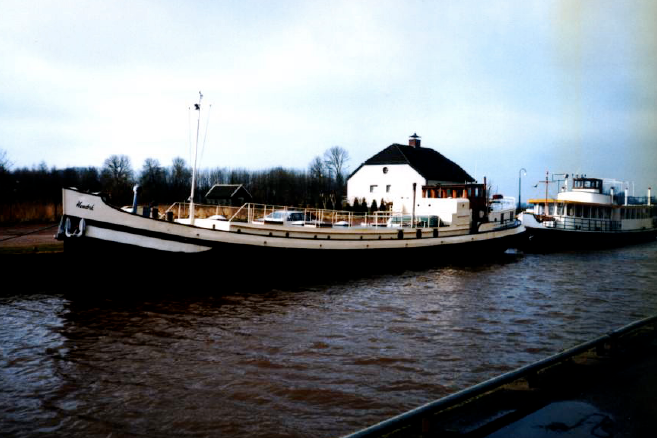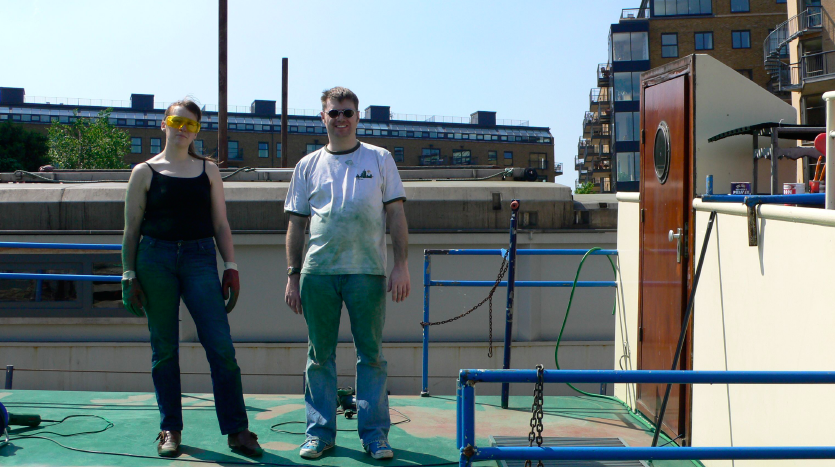
On June 21, 1933, a boat named Tijdgeest sailed from the Volharding yard in Groningen, in the northern Netherlands, for the first time. Tijdgeest, Hendrik’s original name, means Spirit of the Age or Zeitgeist. The IJbema family purchased her, and for 19,000 guilders (the equivalent of 8,700 Euros) they received not only a place of work, but also their home. From then until the war, she ran a variety of jobs all over the Netherlands while the IJbemas worked to pay off her purchase.
During the war she was commandeered by the German Navy. We know some barges were taken for Operation Sealion, Hitler’s abandoned plan to invade the UK, but it seems more likely Tijdgeest was used to ferry war materiel around Germany. The IJbema family feared they would never see their home and livelihood again, especially when Germany was close to losing the war. By chance they heard the boat had been seen in Bremen, so they trekked there – across the front lines!
When they reached Bremen they found the boat in the hands of a Kriegsmarine captain named Otto. While he held them at gunpoint at first, he was a pragmatic man and agreed to let them take Tijdgeest home – on condition that he came with them and disappeared once they reached Holland. The IJbemas tried to find Otto through the Red Cross in the 50’s, but they never saw him again.
 After the war the industrious IJbemas picked up a regular contract shipping flour, honey and other ingredients to a biscuit factory. In 1951 the boat was passed from father to son, and a new generation were born and raised in the three-room back cabin. However by 1968 canal boats of Tijdgeest’s size could no longer compete with the lorries, and the IJbemas could no longer make Tijdgeest pay for herself. Reluctantly, they were forced to sell her and move onto dry land. Tijdgeest was such a part of their family that even now, 40 years later, they follow her progress and are delighted to share their stories with us.
After the war the industrious IJbemas picked up a regular contract shipping flour, honey and other ingredients to a biscuit factory. In 1951 the boat was passed from father to son, and a new generation were born and raised in the three-room back cabin. However by 1968 canal boats of Tijdgeest’s size could no longer compete with the lorries, and the IJbemas could no longer make Tijdgeest pay for herself. Reluctantly, they were forced to sell her and move onto dry land. Tijdgeest was such a part of their family that even now, 40 years later, they follow her progress and are delighted to share their stories with us.
Now renamed to Taling, she suffered rough treatment at the hands of her new owner, who made a profit the only way he could – neglecting her maintenance and running her into the ground. We know relatively little from this period in her history, but we know that by the mid seventies she was in poor shape and her original “Industry” brand engine was beyond repair. In good condition these engines now show up in museums and restored tugs.
 She was given a new lease of life in 1978 when she was purchased for use as an outward bound hotel and renamed Hendrik after the father of her new owners, two brothers and a sister. In several phases they did a great deal of new and restorative work on her, replacing her ruined engine with a reliable Scania truck engine, converting her cargo hold into 12 cabins sleeping up to 26 people, and installing a professional galley with an oven big enough to sleep in.
She was given a new lease of life in 1978 when she was purchased for use as an outward bound hotel and renamed Hendrik after the father of her new owners, two brothers and a sister. In several phases they did a great deal of new and restorative work on her, replacing her ruined engine with a reliable Scania truck engine, converting her cargo hold into 12 cabins sleeping up to 26 people, and installing a professional galley with an oven big enough to sleep in.
For more than 20 years, Hendrik was loved by holidaymakers young and old from the Netherlands, Germany and even the UK. As well as canoeing, their itineraries included cycling and orienteering. We know they were sent off well-provisioned as we inherited 50 thermos flasks with our purchase!
 We bought Hendrik at the beginning of 2007 and sailed her here from the Netherlands, crossing the North Sea in a 36-hour journey. We have a five-year plan to renovate and restore her, turning her into the family home of our dreams and lavishing some care on her original captain’s cabin to restore it to its former glory. Once we have finished, we will rename her back to her original name of Tijdgeest. We hope the IJbema family will be there to see help us christen her.
We bought Hendrik at the beginning of 2007 and sailed her here from the Netherlands, crossing the North Sea in a 36-hour journey. We have a five-year plan to renovate and restore her, turning her into the family home of our dreams and lavishing some care on her original captain’s cabin to restore it to its former glory. Once we have finished, we will rename her back to her original name of Tijdgeest. We hope the IJbema family will be there to see help us christen her.
Comments are closed on this post.
All rights reserved for Tower Bridge Moorings